TRVL Journal: Under the Sea in Fiji
Travel
TRVL Journal: Under the Sea in Fiji
2024 / 5 mins
by Robin Vieira
"Surely, this wasn’t real... I felt a deep appreciation and awe for the places we do not get to see every day. It was a gift to be in this ocean, with these people, feeling so out of my comfort zone breathing underwater as I watched a bustling, vibrant sea life take place. "
- Robin Vieira


Under the sea lies a world unparalleled in our ecosystem, a world that I had yet to dive deep and explore. Becoming a certified PADI Open Water Diver was not something I thought I would ever do. But, when the stars align you don’t question how- you just say yes, with as much humility as humanly possible.
We landed in Nadi International Airport in Fiji and boarded a 16-person island hopper that flew us to the Fijian island of Vanua Levu. Upon arrival, we were greeted by a quaint, one-room airport. Our luggage was delivered on a pushcart, and an air-conditioned van whisked us away to our first home away from home in a village called Savusavu on the southern side of the island. We pulled up to a smiling family singing us “Bula Maleya,” the Fijian welcome song, while we awaited instructions about our first dive of four needed to complete our certifications.
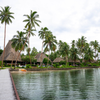
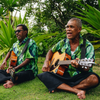
We completed seven dives in three and a half days. Four dives in, I received my PADI Certificate and prepped for my fifth dive, a night dive where you lay witness to life under the sea in complete darkness except for a small flashlight to guide your way. Diving in Fiji was nothing short of exceptional. Every day we dove from the boat and enjoyed coffee and lunch back at the resort. Each dive was unique and offered memorable interactions with turtles, dolphins, colorful reefs, and more fish than I’ve seen in my life. The water was a balmy 80 degrees, and we were comfortable in short, thin wetsuits
We learned from the resident Marine Biologist about reef ecology and restoration, and participated in hands-on opportunities like planting Mangrove Trees, critical coastal protection, and carbon sequestration. Additionally, we learned about the preservation of giant clams, diving down to the ocean floor to scrub their shells to enhance their habitat. The culinary experience was equally enriching with locally caught seafood and harvested vegetation. Departing this serenity, we were serenaded with a goodbye song, “Isa Lei,” hearts full and minds excited for our next adventure: a short flight to the Yasawa Islands.
There’s two ways of reaching the Yasawas: by a small aircraft landing in a grassy field or a five-hour boat ride. Opting for aircraft, we soon landed next to a grass-canopied bench where we were lei’d and driven to Yasawa Island Resort. Nestled in the Yasawas 20 volcanic islands, the Yasawa Island Resort offers pristine white sandy beaches and dive locations.Partnering with the ADE Project, the resort facilitates coral planting to support reef restoration and engage local communities. Our stay included the rewarding opportunity to contribute to coral planting, learning about its positive impact in both marine life and the local villages.
Temperatures on the island were in the 90s and humidity sat at around 80%. The sea was a brilliant turquoise at shore, and as we boated out to sea, the turquoise changed to a deep navy blue. Wearing nothing but a swimsuit and diving equipment, I felt at peace in the water as the current gently tugs you along with the rest of the sea world. Sunlight fell through the surface of the ocean about 10 feet deep, casting warm hues on the purple and blue coral that danced in the current. Surely, this wasn’t real... I felt a deep appreciation and awe for the places we do not get to see every day. It was a gift to be in this ocean, with these people, feeling so out of my comfort zone breathing underwater as I watched a bustling, vibrant sea life take place.
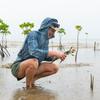
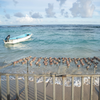
As we flew back to the mainland to await our departure flight back to Los Angeles, I reflected on my time in Fiji. I felt overwhelmed with emotion, aware of my privilege to travel and bear witness to this foreign place and return to the comforts of my own life back in the states. We learned the cost of leaving the island for a local was astronomical, yet Yasawa Resort lotteries out tickets for locals to leave the island for school, work, or even to start a new life. Watching the small island grow smaller and smaller, I held closely onto a few simple thoughts: an appreciation for the Fijian love of simplicity, “Vanaka” (extreme gratitude) for PADI, the Fijian people and culture, and the opportunity to observe a bustling life under the sea.
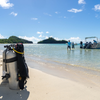
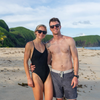
Final Thoughts
If you haven’t gotten your dive certification yet but want to, here are five things I felt apprehensive about prior to this experience that I wish I knew:
- PADI certification is widely available; I began mine in Central Oregon through Central Oregon Diving.
- Typically, about two days of pool training are required before the final four open water dives. Pool training helps you get comfortable with your gear.
- Diving in open water, like the South Pacific, is calmer and warmer than in pools.
- Certification progresses at your own pace; you can move quickly or take your time practicing skills.

